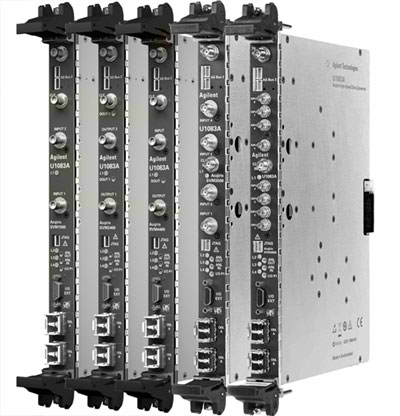Agilent Technologies introduces its Acqiris product line’s highest-resolution VME/VXS digitizer. The SVM4800 is an eight-channel 14-bit digitizer with more than 300 MHz input signal bandwidth, achieving sampling of up to 125 MS/s. This new digitizer is ideal for applications in radar, Electronic Warfare (EW) and Synthetic Instrumentation (SI).
The Agilent SVM4800 builds on the modular U1083A VME/VXS base card with an analog digitizer mezzanine that includes two DC-coupled 14-bit, 125 MS/s quad-ADCs. Agilent know-how in digitizer development combined with extensive use of state-of-the-art technology allow reaching outstanding analog performance, including spurious free dynamic range (SFDR) of up to 82 dBc, total harmonic distortion (THD) of 82 dBc, and signal to noise ratio (SNR) over 70 dBc, leading to an effective resolution of more than 11.2 bits (ENOB) at 125 MS/s. The mezzanine also includes a Xilinx Virtex-5 FPGA that provides data MUX function and static data gain and offset correction.
The base card provides high-performance, real-time data processing by means of two very large Xilinx Virtex- 4 FPGAs, one SX55 and one FX100. The board supports eight 3.125 Gbps serial links on the VXS backplane and two optical links on the front panel supporting up to 3.125 Gbps, providing a substantial aggregate data bandwidth of more than 3.5 GB/s. Its fully compliant VME64x interface supports the 2eSST protocol.
An optional firmware development kit (FDK) is available to help application firmware implementation on the SX55 and FX100 FPGAs. The FDK includes a set of cores to easily interface to the underlying hardware, a base design for each family member to provide very simple, ready-to-use designs, and a test-bench environment for design and simulation.
This product is intended benefit those charged with closing the gaps in emerging threats through new technology or by refreshment of fielded Electronic Support (ES), Electronic Attack (EA) and Electronic Counter Measure (ECM) systems, the majority of which are based on the ubiquitous VME architecture. Longer emitter identification standoff ranges, more precise direction finding in dense emitter environments, and shorter defensive engagement cycles are possible with relatively low incremental development cost. Wideband radar and intelligence-gathering systems are also expected to benefit, with better clutter rejection, range and target differentiation now attainable without massive reinvestment.

Leave a Reply
You must be logged in to post a comment.